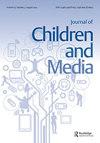Do I have the right to share? Sharenting and psychological ownership of children’s information in the U.S.
IF 2.1
3区 心理学
Q2 COMMUNICATION
引用次数: 0
Abstract
ABSTRACTSharenting refers to parents sharing private information about their children online. While satisfying important needs among parents, sharenting poses privacy risks to children and may interfere with children’s autonomy in constructing their own online identity. Drawing on the concept of psychological ownership in organizational psychology and applying it to the Communication Privacy Management (CPM) framework, this study examines the interrelationships among parents’ psychological ownership of their children’s private information, their motivations for sharenting, and the frequency and types of sharenting behaviors they engage in. An online survey was administered to 429 parents who reported having ever shared private information about their underage children on social media. Based on previous research, two potential dimensions of psychological ownership (possession and responsibility) were proposed and their relationships with each other and with sharenting behavior and motivations were examined. The findings showed a modest correlation between possession and responsibility. Both demonstrated significant relationships with sharenting behavior and motivations, but not always in the same direction. The findings suggest value of adding psychological ownership to the CPM framework. Practical implications for parents, educators, and advocates are discussed.Impact SummaryPrior state of knowledge: Parents are actively sharing private information about their children on social media (sharenting). It poses risks to children’s privacy and interferes with children’s construction of their own identity.Novel contributions: This is the first study to apply the concept of psychological ownership in organizational psychology to the communication privacy management theory (CPM). This advances both the CPM theory and understanding of the sharenting behavior.Practical implications: The findings have practical implications for parents, educators, and advocates who are concerned about children’s identity and privacy online. Greater efforts should be dedicated to educating parents about being good stewards of their children’s private information online.KEYWORDS: Sharentingcommunication privacy management theorypsychological ownershipchildrenprivacy Disclosure statementNo potential conflict of interest was reported by the author.Additional informationNotes on contributorsXiaomei CaiXiaomei Cai, (Ph.D., Indiana University) is an Associate Professor in the Department of Communication at George Mason University in the United States. Her research focuses on sharenting, children’s online privacy, and health message designs for youth and families.我有权利分享吗?美国儿童信息的共享和心理所有权
【摘要】“共享”是指父母在网上分享孩子的私人信息。在满足父母重要需求的同时,“晒娃”给孩子带来了隐私风险,可能会干扰孩子构建自己网络身份的自主权。本研究借鉴组织心理学中的心理所有权概念,并将其应用于通信隐私管理(CPM)框架,探讨了父母对子女隐私信息的心理所有权、分享动机以及分享行为的频率和类型之间的相互关系。对429名父母进行了一项在线调查,这些父母报告曾在社交媒体上分享过未成年子女的私人信息。在前人研究的基础上,提出了心理所有权的两个潜在维度(占有和责任),并考察了它们之间的相互关系以及与分享行为和动机的关系。研究结果显示,占有和责任之间存在一定的相关性。两者都显示了与分享行为和动机的显著关系,但并不总是在同一个方向上。研究结果表明,在CPM框架中加入心理所有权的价值。讨论了对家长、教育工作者和倡导者的实际影响。先前的认知状态:父母积极地在社交媒体上分享他们孩子的私人信息(分享)。它对儿童的隐私构成了威胁,并干扰了儿童对自己身份的建构。新颖贡献:首次将组织心理学中的心理所有权概念应用于沟通隐私管理理论(CPM)。这促进了CPM理论的发展和对分享行为的理解。实际意义:研究结果对关心儿童在线身份和隐私的家长、教育工作者和倡导者具有实际意义。应该加大力度教育家长如何妥善管理孩子在网上的私人信息。关键词:分享沟通隐私管理理论心理所有权儿童隐私披露声明作者未发现潜在利益冲突作者简介:蔡晓梅,印第安纳大学博士,美国乔治梅森大学传播系副教授。她的研究重点是分享,儿童在线隐私,以及青少年和家庭的健康信息设计。
本文章由计算机程序翻译,如有差异,请以英文原文为准。
求助全文
约1分钟内获得全文
求助全文

 求助内容:
求助内容: 应助结果提醒方式:
应助结果提醒方式:


